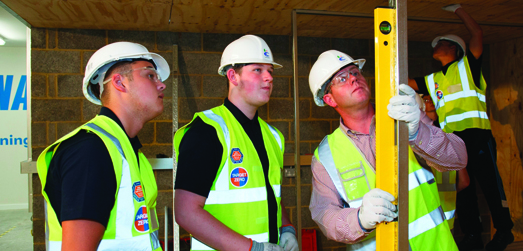
by Clair Mooney | 18 Aug, 2022 | Skills
Approaching 700,000 of students collected exam results today (18 August). This included A and AS levels, level 3 vocational and technical qualifications as well as the new T’Levels – so far over 425,000 of these students have been confirmed places at University, but many others will be considering what next.
A collective effort to promoting careers in the finishes and interiors sector
Now is a vital time for employers to step up and get the message out there that the £10 billion Finishes and Interiors Sector, a sector that employs around 280,000 people is a dynamic part of construction and offers a range of opportunities. This is our opportunity to champion that we are a credible choice, that we create the interior spaces and carry out the finishing that turns a structure into a home, hospital, cinema, hotel or school, basically we put the wow into buildings. We need to make sure that those looking to step into the world of work know that there are opportunities to train for a trade in as an Interior Installer, Plasterer, Dryliner, Carpenter and Joiner, Ceiling Fixer etc. We also need Designers, Building Information Modellers, Surveyors, Contract Supervisors and Project Managers as well as all the other array of roles that support the construction process, from IT through to commercial.
A new opportunity through T-Levels
One group to highlight is that 1,029 students received their T-Level results with 207 of these being in “Design, Surveying and Planning for Construction”. This is the first batch of T-Level graduates who have completed the new 2-year courses. These qualifications are taken after GCSEs and are broadly equivalent to 3 A Levels, but offer a more sectoral and vocational focus. The qualification combines study with a substantial industry placement so that students gain the skills and valuable workplace experience they need to progress into a job, further study or an apprenticeship.
What should employers do
Every great career starts with a job! FIS is recommending all members use the TalentView Construction service to promote any opportunities and jobs available through your business. As well as providing a free job board that is being heavily promoted to school leavers, this service automatically links with the National Apprenticeship Service and ensures that young people have the best possible chance of seeing your vacancy through any career advice that they receive. Consider also making contact with your local college or sixth forms to ensure that they know of any vacancies that you have available that could be communicated to prospective candidates and also reach out to your local Department of Work and Pensions and ensure that all of the local support is being utilised.
So whether you are looking to hunt down a T-Level graduate or are keen to take on a recent school or college lever on as a trainee, apprentice or even offer to sponsor a candidate through their degree there are a range of tools that FIS and others have made available to support a collective effort that helps to present more consistently a dynamic sector full of opportunities.
For top tips and support in promoting careers in the sector visit the Recruitment and Induction section on our website that includes links to useful resources or contact the FIS via telephone 0121 707 0077 or email info@thefis.org.
Targeting school leavers in 2023 and beyond
Effectively targeting the 700,000 annual school leavers and inspiring young people to think about a career in construction is critical. To support you in this work the STEM Construction and Built Environment Ambassador programme provides vital training, tools and support, giving you confidence that the message is right and we are working (and learning) consistently as a sector. Becoming an ambassador will also plug you in to the STEM network and will open up opportunities to visit schools and careers fairs.
Ambassadors play an essential role in inspiring young people to think about a career in construction through a range of activities, these include school presentations, careers talks and mentoring. If you are interested in becoming a STEM Construction and Built Environment Ambassador, you can find out more by joining our webinar, register here . Remember you are not alone and we are here to help. At FIS we have members of our team who have completed the training and are actively working as ambassadors, we are maintaining a network of ambassadors and are using this network to better understand how to target our approach and to develop resources. More on construction ambassadors here
If you are interested in offering T-Level industrial placement in 2022/2023 please email info@thefis.org and we will make the necessary introductions.

by Clair Mooney | 18 Aug, 2022 | Skills
From 1 August 2022, the 20% off-the-job requirement for all apprenticeships will no longer apply. It will be replaced by a baseline of six hours per week, irrespective of hours worked by the apprentice. It means apprentices who work more than 30 hours per week can now spend less than 20% of their time doing off-the-job training. The Education and Skills Funding Agency (ESFA) has stated that this move, part of a package of changes to apprenticeships, ‘must not dilute the existing requirement, but provide the right level of training to every apprentice’. This shouldn’t be a problem for the training providers and employers. Employers have control over the training provided in the workplace.
It is an eminently sensible rule change and it should lead to a rise in apprenticeship numbers for these three reasons:
- Apprentices will be able to contribute more at a time when many businesses are still struggling to recover from the impact of the pandemic.
- It levels the playing field, meaning all apprentices will be required to engage in the same number of off the job hours, and are not penalised whether they work 30 hours a week, or 48 hours a week.
- It will be much more easily administered without the need for complex and varied calculations which have been an administrative burden for Training Providers
This now aligns to an academic training day of six hours rather than the working day of 7.5 hours, allowing Training Providers to standardise and create learning programmes for cohorts rather than individuals. It is advisable to create a working relationship with your Training Provider to ensure you know what subjects the apprentices will be covering when they are with the them. This does not remove the employers responsibility for training apprentices in the workplace and giving them time to practice the skills they learn in training in the workplace. If you need more information contact George on 07553 874838 or email georgeswann@thefis.org

by Clair Mooney | 18 Aug, 2022 | Skills
Apprenticeships experts warn that the Treasury must be more transparent on how it spends the billions returned to its coffers. The rigid apprenticeship system is blamed for billions of skills funding going unspent by businesses and being returned to the Treasury. More than £3.3 billion has returned to the Treasury in the last three years under the Government’s use-it-or-lose-it apprenticeship levy rules, according to new data collected by apprenticeships experts the London Progression Collaboration (LPC).
The LPC, which to date has helped transfer £10 million of unspent apprenticeship levy from large employers to support small businesses and create over 1,000 apprenticeships, says that it is not clear how the Treasury is making use of the £3.3 billion that it has received from businesses. The apprenticeship experts warn that this lack of transparency means it is unclear whether the Treasury is using the unspent levy in a way that best supports the places most in need of levelling up, and whether it is helping create more entry-level apprenticeships, after numbers have plummeted in recent years.
The LPC argues that if the apprenticeship levy is to meet its objective of increasing employer investment in training, the Treasury needs to give employers greater control over how their funds are directed, including by increasing the 25 per cent apprenticeship levy transfer cap. The LPC has seen at first hand the challenges the current system poses to businesses in their work helping firms navigate the complex apprenticeship system and transferring their unspent levy to small businesses.
These findings follow previous research by the LPC which shows that since 2014-15, ‘entry-level’ apprenticeships have fallen by 72 per cent in England, while apprenticeship starts amongst under-19s have fallen by 59 per cent, depriving those most at risk of in-work poverty and at the beginning of their careers the best start in life.
Commenting on this information, FIS CEO, Iain McIlwee stated:
“We need clarity here, Government increasingly expects employers to act as finishing schools, but is simply not providing adequate support for the investment that this entails. We need a serious rethink about how education is built around careers and preparing people for the world of work, not purely academic outcomes. The chasm between education and industry seems to be widening and the answer is not more stealth tax!”
Source IPPR

by Clair Mooney | 17 Aug, 2022 | Main News Feed
The awards are a joint event between the Worshipful Company of Plaisterers and FIS to recognise achievement and excellence in plastering and interior trades. The event will be held at Plaisterers’ Hall on 22 November and will celebrate the achievements of students and apprentices in our sector, as well as organisations and individuals that champion skills and training for the benefit of our industry. It will also provide networking occasion for like-minded individuals to come together. You can book your seats here.
If you haven’t yet entered the awards, there’s still time to nominate. The awards recognise:
- The achievement of apprentices
- Students who have exceeded beyond expectations
- The delivery of training by colleges and training providers
- Training delivery by an FIS member company
- Mentors and others who have supported sector training
- Lifetime contribution to sector training
If there is an indivdual or business you’d like to nominate, you can find out more details on how to enter here.

by Clair Mooney | 11 Aug, 2022 | Main News Feed
New guidance published by the government aims to provide businesses and workers – particularly in the gig economy – with greater clarity over employment status and the rights and employment protections people are entitled to at work, including pay, leave and working conditions.
Featuring real world examples of what an individual’s working day or contract may involve – and how that translates into their employment status – the guidance will help smaller businesses that have less capacity and legal expertise to understand the law and reduce the risk of companies being fined for unknowingly breaking the rules. At the same time, workers can see what rights they are entitled to at work and will be able to have informed discussions with their employer and take steps to claim or enforce rights where necessary.

by Clair Mooney | 11 Aug, 2022 | Skills
Construction workers are being charged excessive sums by unaffiliated third party websites for their Construction Skills Certification Scheme (CSCS) cards when they could pay just £36 via the official application service. CSCS continues to receive complaints from those who have used third party companies to apply for their CSCS cards. These companies are unaffiliated to CSCS and simply use the official CSCS application service on their client’s behalf, while charging an admin fee. Many of these complaints relate to inflated costs and slow delivery times for cards.
There is only one official service: cscs.uk.com/apply. A card costs £36 and in most cases, applications will be processed, and cards issued within 48 hours. Reports have been received of construction workers paying upwards of £60 just for their CSCS card. If you are charged more than £36 for a card or £22.50 for the separate CITB Health, safety and environment test you should ask why. The quickest and cheapest way to apply for your CSCS card is via the official online service. Online applications are quick, easy, and secure, for more information visit www.cscs.uk.com/apply. If you need help contact FIS on 0121 707 0077 or email info@thefis.org

by Clair Mooney | 11 Aug, 2022 | Skills
CITB has announced an investment of more than £800,000 for the launch of a new employer network pilot project, which could revolutionise the way the construction sector access and receive funding for training in the future. Over 3,800 levy-registered construction businesses will be eligible to benefit from the pilot, offered across five locations in England, Scotland and Wales. While the pilot is open to businesses of all sizes, there is a primary aim to simplify the process for small and micro businesses, helping to place them at the heart of local training provision.
Through the support of established and experienced delivery partners, the pilot enables employers to recognise their training priorities and receive guidance on how best to find and fund the training most appropriate to them. This transformative way of working provides a huge opportunity for employers to not only voice their training requirements, but also play a fundamental role in deciding how funds are used in their local area.
As part of this new model, construction businesses will not need to access the grant scheme, as CITB is supporting the employer network to help organise and fund training directly. Many of the current requirements around training being “in scope” will also be relaxed to ensure the pilots can be as reflective of the employer’s needs as possible. Therefore, training can predominantly be in anything that helps a business work better, whether that’s a construction skill; a health and safety course; a business skill; or a future skill need, such as net zero. The five pilot areas covered are:
- Inverness in Scotland, provided by Scottish Civils Training Group
- Norfolk in England, provided by Norfolk Construction Training Group
- Lincoln in England, provided by Lincoln Group Training Association
- South West Wales, provided by Cyfle Building Skills
- The final pilot is specifically for Civil Engineering firms in the Midlands, provided by CECA Midlands.
If you would like information, advice or guidance on support available from CITB give Marie Flinter a call on 07799 903103 or email marieflinter@thefis.org

by Clair Mooney | 11 Aug, 2022 | Skills
Making sure more adults can gain the skills they need to secure good jobs with higher wages is a key priority for the government. Levelling up skills supports our economy to grow, as well as benefiting both workers and employers. That’s why government introduced the Free Courses for Jobs offer in April 2021. The scheme is proving popular, with data pointing to over 20,000 people having enrolled on courses by May 2022, taking advantage of the opportunity to get in-demand skills for free.
Moreover, nine in ten people surveyed say they believe it will help them progress in their careers, while the vast majority (97%) say they are enjoying their course. Free Courses for Jobs offers adults aged 19 or over access to over 400 qualifications free of charge. It’s aimed at people without a full qualification at Level 3, such as A Levels, diplomas or an advanced technical certificate, or those who are unemployed or earning low wages.
Courses are available in subjects ranging from engineering and construction to adult care and digital, allowing adults to access better job opportunities and boost their earning potential. The scheme also benefits employers, who can support their existing staff to upskill or reskill into a higher-level role in their business without needing to fund the training. Research shows that Free Courses for Jobs has increased uptake of these key qualifications, meaning more adults are making the most of this opportunity to boost their skills free of charge.

by Clair Mooney | 11 Aug, 2022 | Main News Feed
As the deadline for transition from CE to UKCA marking approaches, and in response to continuous industry pressure over capacity and capability, there has been an announcement from the Government regarding some provisions that have been agreed to simplify UKCA marking for products in England, Scotland and Wales.
The full guidance from the Government can be found here, but the principal changes of interest as they relate to construction products are summarised below.
Spares – The UK will continue to accept spares onto the GB market to repair, replace and maintain products to the same conformity requirements in place at the time the original product or system was placed on the GB market.
- Businesses will need documentary evidence to demonstrate the intended use of a product as a spare part.
- This applies to products in stock as spares before the deadline. FIS is seeking further clarity on whether any nuance exists for construction products after the deadline.
Imported Goods – Existing CE marked stock imported into GB under contract before the end of 2022 will not need re-testing and re-marking.
- Products imported into GB for further manufacture or processing, will not be considered as placed on the market.
- FIS is seeking further clarity on the definition of “further manufacture or processing”.
Re-Testing Costs – Manufacturers whose products are tested under AVCP System 3 by an EU notified body before 31 December 2022 can use this evidence to obtain a UKCA mark without having to retest through a UK approved body.
- All new testing after this date must be done through a UK approved body.
Reduce Re-Testing Costs – The UK will allow certificates provided by non-UK conformity assessment bodies (CABs) issued before the end of this year to be used as a basis for UKCA marking certification.
- The goods must still bear the UKCA marking, and will need to undergo conformity assessment with a UK Approved Body at the expiry of the certificate or after 5 years (whichever is sooner).
There is no clarification at this time if the EU intends to mirror any of these simplification measures, so it is assumed that there are no relaxations on the use of EU notified bodies and/or CE marking goods that are being sent to the EU.
Please take some time to review how this will impact your businesses and let us know what outstanding questions or inconsistencies remain so that we can feed these back to Government.
FIS has created how-to guidance for its members which can be Conformity Marking – how-to guidance.

by Clair Mooney | 10 Aug, 2022 | Sustainability
Last year, the Cabinet Office issued a Public Procurement Note stipulating that government contracts procuring goods and/or services with an anticipated contract value above £5 million per annum will require suppliers to provide evidence of carbon reduction plans. The PPN applies to all Central Government Departments, their Executive Agencies and Non Departmental Public Bodies. Essentially, evidence of a carbon reduction plan becomes one of the selection criteria for bidding suppliers.
Whilst large companies will be aware of this Procurement Note, it is becoming apparent that big suppliers (clients and contractors for instance) are cascading this requirement down through their supply chains and it is reaching SMEs. It would be useful to hear if you have experience of this and how you are meeting this requirement – email details to flavielowres@thefis.org
The PPN includes a template at Annex A for a basic Carbon Reduction Plan confirming the supplier’s commitment to achieving Net Zero by 2050 and setting out the environmental management measures they are taking and which will be in place throughout the duration of the contract.
You can see the 10 page Procurement Policy Note here.

by Clair Mooney | 9 Aug, 2022 | Main News Feed
The Recovery Loan Scheme, which originally launched in April 2021 to help businesses recovering from the pandemic, has been extended to 2024.
The maximum loan size remains at up to £2m, and the principle behind the extended scheme remains unchanged: the government will underwrite 70% of lender liabilities, at the individual borrower level, in return for a lender fee. Lenders must ensure that the benefits of the government guarantee are passed through to businesses.
Full details of the scheme are available on GOV.UK.

by Clair Mooney | 9 Aug, 2022 | Market data
The latest weekly update from CPA is available to members here. The updated issues are in Pages 1-6 of the weekly update whilst subsequent pages have existing data and information that remain relevant. This update includes:
- Bank of England Monetary Policy Report (August 2022)
- S&P Global/CIPS UK Construction PMI (July 2022)
- ONS UK Construction Materials Prices (June 2022)
- ONS Construction Employment by Age-Demographic (2022 Q1)
- ONS Construction Employment by Gender and Occupation (2022 Q1)
- Taylor Wimpey Half Year Results (August 2022)

by Clair Mooney | 8 Aug, 2022 | Main News Feed
The Gypsum Products Development Association (GPDA) who represent the Gypsum based building materials industry have issued an update on the use and limitations of drywall specifications and standard details which can be accessed here.

by Clair Mooney | 5 Aug, 2022 | Main News Feed
Now that Making Tax Digital for VAT has started to bed in, we can expect to see HMRC starting to impose penalties for failures to comply with the detail of the legislation; so now is the time to make sure you have checked your process. More information on how to avoid penalties for Making Tax Digital for VAT is available here.

by Clair Mooney | 4 Aug, 2022 | Main News Feed
The New Hospital Programme (NHP) is hosting an Industry Day on Tuesday 20 September to outline how businesses across the supply chain can play a role in the biggest hospital building programme in a generation. With a target to develop 48 hospitals by 2030, the NHP will set out how it is building better, faster and greener ahead of the forthcoming procurement launch of the NHP’s Framework Alliance. Places are limited and members can register their interest to attend either in‐person at the Vox Conference Venue in Birmingham (B40 1PU) or online.
The NHP has previously published the NHP Supplier Guide outlining what it requires from its supply chain, along with the first NHP commercial pipeline which provides visibility of current and future contract opportunities up to 2024.

by Clair Mooney | 4 Aug, 2022 | Market data
The latest results published under the
Duty to Report on Payment Practices and Performance show that Build UK members have maintained their
payment performance over the last six months, despite the significant pressures caused by rising inflation. Contractor members are now reporting an
average of 31 days to pay invoices, down from 32 days at the start of this year and 45 days when the Build UK table was first published in July 2018. On average, they are paying 94% of invoices within 60 days, up from 82% four years ago.
Commenting on the figures, FIS CEO Iain McIlwee said:
“On the surface this is encouraging, but we do have to dig behind the numbers. Here we are simply measure the time lag from invoice being raised to invoice being paid. In the modern digital world, there are few excuses for being late. If we look past the numbers we are still seeing applications for payment disputed to slow down the invoice, pressure to accept long payment terms, discounts to pay on time and worse tenders being scattered to trap the unsuspecting in suicide bidding in order to meet unsustainable pricing. These are challenging conditions and the whole supply chain needs to react – some are, but in parts of the market there is little empathy and support for the SMEs in the supply chain.”
Build UK’s payment performance table features more than 100 of the industry’s largest companies, including contractors, clients and housebuilders, to provide a comprehensive picture of payment practices across the construction industry.
All the latest business news can be found in Build UK’s Improving Business Performance update.

by Clair Mooney | 29 Jul, 2022 | Market data
The latest weekly update from CPA is available to members here. The updated issues are in Pages 1-3 of the weekly update whilst subsequent pages have existing data and information that remain relevant. This update includes:
- Bank of England Mortgage Approvals (June 2022)
- RICS UK Commercial Property Market Survey (2022 Q2)

by Clair Mooney | 21 Jul, 2022 | Skills
National Construction College in Bircham Newton (NCC East) are delivering training for Dryliner and Ceiling and Partition apprentices and plan to continue this with registration now open for apprentices on courses starting:
- Monday 12 September 2022
- Monday 28 November 2022
For full details please contact Andrew Voase, andrew.voase@citb.co.uk 07798 628902 or Trudie Blackshaw, trudie.blackshaw@citb.co.uk telephone 07770 841816.
You can view the apprenticeship standard: https://www.instituteforapprenticeships.org/apprenticeship-standards/interior-systems-installer-v1-0 this provides the criteria on which the training programmes are based.
For organisations that are CITB registered enhanced grants are available for apprentice travel and subsistence covering up to 80% of the costs, please see: Apprenticeship travel and accommodation funding ‘Travel to Train’ – CITB
On the FIS website there is a downloadable document, Apprentice – Guidance for Employers, that is worth a read at https://www.thefis.org/skills-hub/apprenticeships-and-qualifications/apprenticeships-employers/, the document contains links to all the details you’ll need. In addition, FIS will be happy to provide further information, advice and guidance for taking on an apprentice, contact georgeswann@thefis.org or telephone 07553 874838 or Marie Flinter marieflinter@thefis.org or telephone 07799 903103.

by Clair Mooney | 18 Jul, 2022 | Market data
Construction product manufacturers reported an eighth straight quarter of sales growth in Q2, according to the Construction Products Association’s State of Trade Survey. Combined with another quarter of broad and accelerating cost inflation, expectations have been dampened for the year ahead, however.
In Q2, 30% of heavy side manufacturers and 17% of light side manufacturers reported that product sales increased compared to 2022 Q1. Alongside this, all heavy side firms and 94% of those on the light side reported an annual rise in costs. For the heavy side, this was the fourth consecutive quarter of universal cost increases that span across inputs such as fuel, energy, raw materials and labour.
Against a broader economic backdrop of rising inflation, manufacturers cited that demand is likely to be the key constraint on activity going forward, leading to the first negative balance for expected sales since mid-lockdown in 2020. On balance, 30% of heavy side firms, whose products tend to feed into the earlier stages of construction, anticipate a decrease in sales in Q3 and one-third anticipate a fall in 12 months. As a result, 11% also envisage a decrease in their labour force in the year ahead.
Rebecca Larkin, CPA Senior Economist said:
“In recent quarters, construction product manufacturers have reported escalating inflationary pressures across fuel, energy, raw materials and wages. Added to this, there are early reports that higher costs further down the supply chain for transport, insurance, reverse charge VAT, and the removal of the red diesel rebate are starting to be reflected in lower confidence and delayed decision-making for new construction projects.”
She also adds: “Demand currently remains strong, particularly in the housing, RM&I, industrial and infrastructure sectors, but the headwinds related to costs are intensifying. Consumer price inflation is yet to peak too, which poses a downside risk if households and businesses rein in spending as disposable incomes and margins are eroded.”
Key survey findings include:
- A balance of 30% of heavy side firms and 17% of light side firms reported that construction products sales rose in Q2 compared with the previous quarter, the eighth consecutive quarter of growth
- Sales balances weakened from 43% (heavy side) and 50% (light side) in Q1
- 30% of heavy side manufacturers anticipate a fall in sales in Q3, whilst 17% of light side firms expect an increase, the lowest balance since the first national lockdown in 2020 Q2
- Costs for fuel, energy, raw materials and wages & salaries rose for all heavy side manufacturers
- Costs are expected to increase over the next year according to balances of 78% on the heavy side and 94% on the light side
- Weaker hiring intentions were reported by both heavy side and light side manufacturers
Overall, the Q2 survey results provide the first indication that the inflationary backdrop is now starting to impact on confidence around the near-term outlook for construction.

by Clair Mooney | 14 Jul, 2022 | CSCS, Skills
CSCS is aware of concerns raised by many within the construction industry regarding the decision to withdraw cards issued under Industry Accreditation (IA). They have published an article setting out some of the common areas of concern and information on how they can be resolved: Construction Skills Certification Scheme | Official CSCS Website – Industry Accreditation: Common queries answered
Here are some extracts that should be useful to FIS members:
What is Industry Accreditation?
Industry Accreditation (IA) was a mechanism by which workers could obtain CSCS cards on the strength of an employers’ recommendation rather than the achievement of a recognised qualification. CSCS stopped issuing new cards under IA back in 2010, but if you previously held a card under IA the scheme rules allowed you to continue to renew.
Why is Industry Accreditation being withdrawn?
CSCS, together with their 37 partner card schemes, are bound by the Construction Leadership Council’s (CLC) requirement that all construction industry card schemes must operate with nationally recognised qualifications in place for all occupations. This requirement is particularly important when addressing the IA issue. To satisfy the Construction Leadership Council’s requirements CSCS announced plans to withdraw cards issued under IA, which include:
- IA cards issued from 1 Jan 2020 will expire on 31 Dec 2024 and will not be renewed
- CSCS will cease renewing IA cards from 30 June 2024.
What options are there to move off Industry Accreditation?
- Vocational qualifications already achieved: cardholders who have achieved the qualifications for their occupation can renew their card for the full five-year term as normal.
- Academically Qualified person card: This card is available to people who have completed certain construction related degrees, HNDs, HNCs, CIOB Certificates and NEBOSH diplomas. Further details can be viewed here.
- Professionally Qualified person: This card is available to competence assessed members of CSCS approved Professional Bodies of which CIOB is one. Further details can be viewed here.
- Not everyone needs a card: There will be IA card holders who no longer require their CSCS cards. For example, you may have moved into a management role, become a director, or rarely visit site. In these scenarios, you do not require a CSCS card.
Those unable to fit into these four scenarios will be required to register for the appropriate qualification for their occupation before their cards expire in 2024.
If you or your workforce need a qualification to show proof of competence contact FIS, we have negotiated offers and discounts in training and qualifications specifically for members. Call 0121 707 0077 or email info@thefis.org or take a look at the FIS website: Member Benefits Training and Qualifications






















